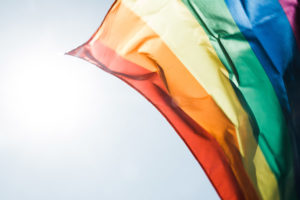Simultaneously Fighting for Secular Government and LGBTQ Rights
 Photo by Peter Hershey via Unsplash
Photo by Peter Hershey via Unsplash Today, LGBTQ rights have become the battleground in the US culture war between those clinging to discriminatory religious beliefs and a growing coalition of the nonreligious and their progressive religious allies.
Among all religious categories, nontheists are the most supportive of LGBTQ rights. According to the Pew Religious Landscape survey, the three religious identities with the highest percentage of acceptance of LGBTQ rights are the unaffiliated or religious “nones,” Buddhists, and Jews—none of which have majorities who believe in an intervening god. The least accepting of LGBTQ people are the most fundamentalist in religious belief, including Jehovah’s Witnesses, Muslims, Mormons, and, in the greatest raw numbers, evangelical Christians. This doesn’t mean that every nontheist is supportive of equality or that evangelicals are automatically bigoted, but it does suggest where one is likely to find friends, and where one isn’t.
Christian fundamentalists (and other right-wing religious extremists) are anti-LGBTQ by default. This is almost intuitive since they accept their outdated religious prohibitions literally, but evidence beyond the just-mentioned Pew poll abounds. Of the 139 campuses that Campus Pride list as the “absolute worst” for LGBTQ youth, seventy received Title IX religious exemptions to allow discrimination against LGBTQ people, and thirty-two more have similar requests pending. Mormons, Baptists, Muslims, Catholics, Methodists, and Orthodox Jews all have anti-LGBTQ prohibitions that frequently boil down to accepting LGBTQ people as long as they never act on their same-sex attractions—meaning, not only that they don’t accept LGBTQ people, but that they also engage in harmful psychological shaming of natural desires.
Leaders among the religious right have sharpened their faith into a weapon against those whose presence is a threat to their narrow-minded beliefs. Forgetting their campaigns in the past when they claimed that gays and lesbians wanted “special rights,” they’re now sharply focused on seeking special religious rights to discriminate against gays, lesbians, and anyone else who doesn’t fit within their limited understanding of morality. That’s exactly what Attorney General Jeff Sessions is doing with his new Religious Liberty Taskforce—seeking new ways to provide religious exemptions to existing laws.
Amongst other indicators of an anti-LGBTQ agenda, Lambda Legal reported last year that nearly a third of President Trump’s judicial appointments have records that “demonstrate hostility towards the rights of LGBT people.” And many of those without such a record probably share their prejudicial viewpoints. The Trump administration is also no longer identifying the numbers of LGBTQ Americans in the US Census, a critical concern since statistical evidence is key in establishing funding to counter violence and discrimination. Such regressive policies don’t arise spontaneously.
With no openly LGBTQ appointments higher than ambassador, the Trump administration is a who’s who of anti-LGBTQ politicos. Vice President Mike Pence is leading the pack of government officials set on dragging America backwards—that’s the same Pence about whom Trump jokingly said, “Don’t ask that guy [about gay rights], he wants to hang them all!’” Pence is backed up by Sessions, Secretary of State Mike Pompeo, Secretary of Education Betsy DeVos, Secretary of Housing and Urban Development Ben Carson, Assistant Secretary of Health and Human Services for Public Affairs Charmaine Yoest, and many more.
Short of an administration change, humanists and others who care about equal rights must follow those leading programs of resistance, ally with as many others as will work with us, and lead the way when we have the best chance of preventing regression and advancing humanistic change.
